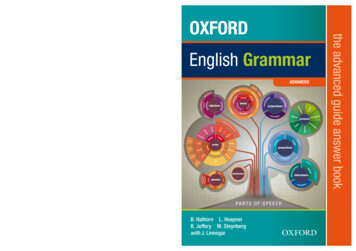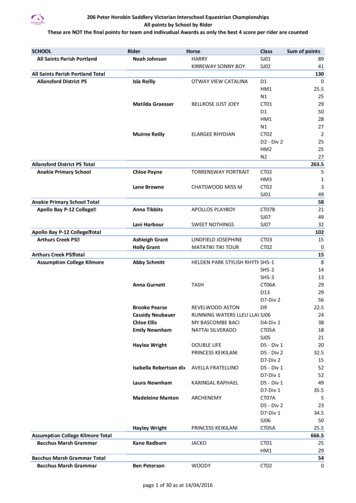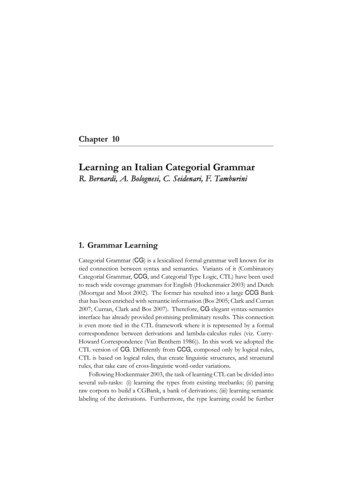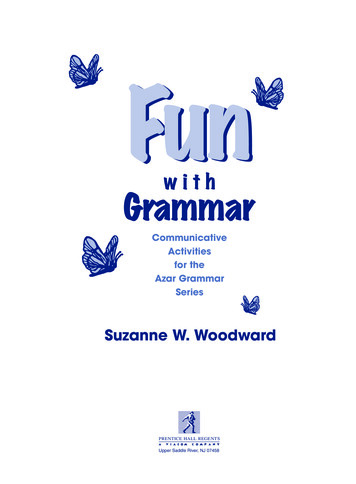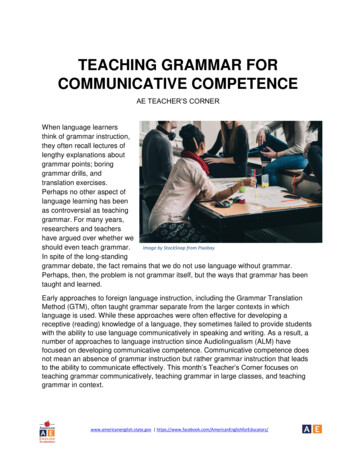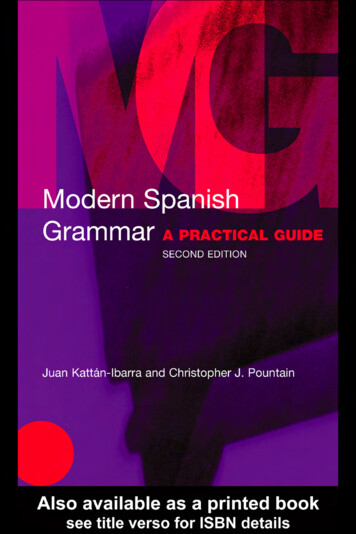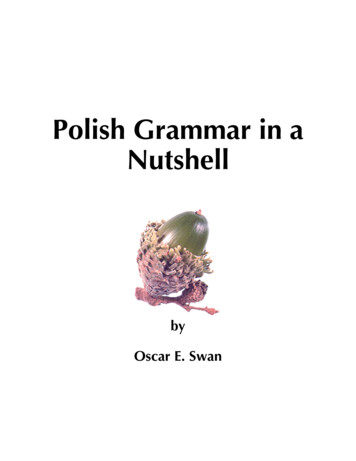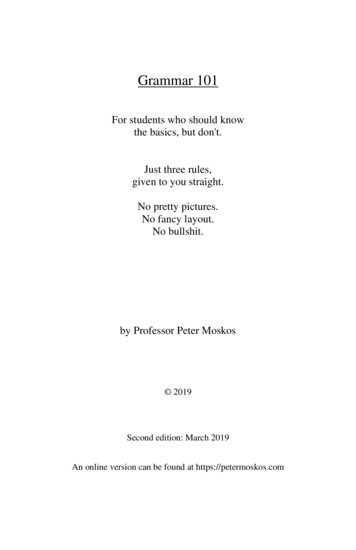
Transcription
Grammar 101For students who should knowthe basics, but don't.Just three rules,given to you straight.No pretty pictures.No fancy layout.No bullshit.by Professor Peter Moskos 2019Second edition: March 2019An online version can be found at https://petermoskos.com
Table of ContentsIntroduction: Is Grammar 101 right for you?1Rule #1: Write in complete sentences3Rule #2: The subject and verb will agree6Rule #3: Use commas correctly9Everything else:The misunderstood apostrophe12Who and whom13Less and fewer14Capitalization: Stop doing itfor no reason, damn it!14Periods and commas go inside quotation marks 15Stop using the dastardly semicolon!15The unloved hyphen16Adjectives and adverbs17Avoid passive verbs17Infinitives and gerunds: Verbs without shame! 18“Rules” to know before ignoring them18Homonyms: same same, but different20Ten sexy writing tips to driveyour partner wild21
1Introduction: Is Grammar 101 right for you?Are you in college and still fumbling with basicgrammar? Are you getting bad grades on writingassignments even though you know what you’re tryingto say? If you’re not clear about the difference betweena subject, a verb, and an object, this little booklet is foryou.Grammar 101 is for smart students who shouldknow the basics of grammar but do not. If it makes youfeel better, you’re not alone. Maybe English isn’t yourfirst language. Maybe you never had a teacher whotaught grammar. Perhaps you’ve only had teacherswho circle what is wrong without ever teaching youwhat is right. Some professors are afraid to edit in redbecause they may hurt your tender self-esteem. But mygoal isn’t to make you feel better. I want you to writebetter. At some point you need to learn basic grammar.Besides, maybe it is your fault you can’t writecorrectly. Maybe you goofed off in high school.Maybe you didn’t give a damn what made a sentence“complete.” Maybe you thought you didn’t need tolearn this crap. And now you know you were wrong.No problem. There’s no shame in learning. Better latethan never.This guide is not an advanced guide to writing orstyle. My goal is simply to bring your writing up to alevel where whoever grades your paper doesn’t think,“Is this person an idiot?” I want to make sure yourfuture employers don’t toss your résumé whilesnickering, “Another proud product of New York Citypublic schools!” (And I have nothing against publicschools. I am a product of them myself.)Grammar 101
2Writing is more formal than speaking. You need tolearn the basics of Standard English grammar. Sure,some of these rules don’t necessarily make sense. Theycan even be culturally and racially biased. But whilethere’s nothing inherently better about one kind ofEnglish over another, in mainstream America you needto write correctly in Standard English. If you don’t,many people — including those who grade collegepapers and read job applications — will look down onyou. But you probably already know that, or else youwouldn’t be reading this.So where should you start? A good first step is tobuy a dictionary. Sure, you can look up words online.But a real dictionary on your desk is a tool of the trade.A dictionary by your side says you’re serious aboutschool and writing. Plus, they’re cheap. My favorite isMerriam-Webster’s Collegiate Dictionary. You canprobably find one used or at a stoop sale for 2. If youwon’t buy a dictionary, bookmark merriamwebster.com.The second step is not to be overwhelmed. You cango quite far in life without knowing what exactlyconstitutes, say, a participial phrase. I mention thisbecause, honestly, I’m not 100 percent sure what itmeans. You can learn basic writing and grammarwithout knowing all the terms, but some nomenclature(use your dictionary whenever you don’t know a word)is essential.The good news is that grammar comes naturally.Even if you don’t know what complete sentences are,you probably use them when you speak. Now let’s getgoing!by Peter Moskos
3Rule #1: Write in complete sentencesSentences need one subject, one verb, and usually oneobject. Grasp this and everything else will start to fallinto place. To repeat, a sentence is nothing more than asubject, a verb, and (probably) an object. Let’s breakthis baby down.The subject is a noun: a person, place, or thing. Itis what does something. House, subway, the Bronx,and DJ are all nouns. You can usually put the in frontof a noun.The verb is the action word: go, stay, eat, drink, orkiss. In a sentence, the verb is what the subject does.The object is also a noun (a person, place, orthing). The object (also known as a direct object) iswhat something is done to.Take this sentence: The DJ spins the records. Tryto identify the three parts of speech. The subject is theDJ (he or she on the wheels of steel), the verb is spins(what the DJ is doing), and the object (what somethingis being done to) is records. If you have a subject, averb, and an object, you have a complete sentence.End that shit with a period and you’re done.Congratulations! That’s half the battle. If thesentence were The DJ is spinning the records, then theverb would be is spinning. A verb can be two words.No worries.Take this gem of a sentence: She slapped her twotiming man. It’s a perfectly fine sentence. Let’s breakit down backward. What’s the object? Ask yourself,“Who got slapped?” The man. The verb, whathappened, is slapped. She is the subject, the one whodid the slapping.Grammar 101
4By the way, not that you asked, but I, you, he, she,it, we, you, and they are called pronouns. In writing,try to keep pronouns to a minimum because they’revague. August Vollmer, Robert Peel, and Bill Brattonwalked into a bar. He told a joke. Who? Which one?Or: There is a mess in the precinct. It is nasty. Is theprecinct nasty? Or the mess? We can’t be certain. Usethe specific noun whenever possible.Once you have a subject, verb, and object, end thesentence with a period. You could go on but why?Keep things short and simple.Some verbs do not need an object to make acomplete sentence. The subway screeches, The mantalks, and Jesus rises. These are all perfectly finesentences. Verbs that need objects are calledtransitive. Verbs that don’t need objects are calledintransitive. Dictionaries will tell you if a verb is oneor the other or can be either.This might be a good time to mention thatsometimes sentences don’t need subjects. If you ordersomebody to do something, it’s called an imperative.Go to the store. Get off that baby. Put out that fire.Fuck me! None of these actually have an explicitsubject, but “you” is there in spirit.If you do not have a complete sentence, you have aphrase (or clause). A phrase can be a lot of things,but it’s less than a sentence. Watch me turn theprevious sentence into two: A phrase can be a lot ofthings. It’s less than a sentence. Instead of , but, I useda period and started a new sentence. Both aregrammatically correct. As a general rule, shortersentences are better. If you insist on combining twocomplete sentences into one, do so by placing a commaby Peter Moskos
5before an and or but (and also sometimes or orbecause).If you have a sentence like this, then you need toseparate the two parts of that sentence with a comma.That preceding underlined part could be a completesentence (in the context here, it is called anindependent clause because it can stand alone).The if in the sentence above — and it could beanother word like while, as, because, although, orwhen — makes the first part of the sentence a phrasecalled a dependent clause. It is dependent onsomething else to make it complete.You can also put phrases in sentences to modifythings, to make things more complicated, and even toadd maudlin poetic beauty to your writing. But aphrase such as maudlin poetic beauty doesn’t standalone as a sentence. You would need to say: Maudlinpoetic beauty is probably not what you’re going for.Take the phrase Wherever she goes. It can’t standalone. It doesn’t make sense standing alone. It lacks asubject. It’s begging for completion.Of course you could use Wherever she goes toanswer a question like Where do you follow her? Thenthe subject, verb, and object (I follow her) are allimplied in your answer. You could also say She goeswherever, and this would be a complete sentencebecause wherever just got changed into the object (andthe meaning changed, too). But let’s stick with theoriginal.Wherever she goes, she leaves the men talking.Now there’s a sentence! The core sentence? Thesubject, verb, and object: She leaves men. Everythingelse — even if essential to the meaning — is just icingGrammar 101
6on the tasty cake of basic grammar. A phrase may beessential to the meaning of a sentence, but it’s not vitalto the core grammar of the sentence.Here’s a quick summary quiz. There are just threewords in the following sentence. She eats food.Identify the subject, verb, and object. Assuming theanswer is now obvious, read on.Rule #2: The subject and verb will agreeThe subject and verb must agree in two ways: 1)singular or plural, and 2) person. Ah, yes, but whatdoes “agree” mean? Or “person,” for that matter?“Agree” means that if the subject is singular, the verbmust be singular. If the subject is plural the verb mustbe plural. Singular means just one. Plural is more thanone. It really is that simple.A singular subject could be I, she, or a 40-ouncebottle of King Cobra. Even a case of 40-ounce bottlesof King Cobra is singular. Why? Because there’s justone case. This is why you need to identify the subject.Everything after the of is adjective fluff, in this casedescribing case. A word that describes a noun is calledan adjective. In the case of this case, everything afterthe of describes the case.If the subject is plural, the verb has to be plural.The only thing you have to watch out for is the thirdperson singular of the verb. It usually ends in s. Theydrink whiskey. She drinks wine.If the subject is anyone, everyone, someone, noone, nobody, the verb is singular. That’s just a rule. It’sthe same with neither and either. Either Zora or Peterneeds to clean up this mess (one of them, hencesingular). Similarly, Neither she nor he has cleaned upby Peter Moskos
7the mess (singular). And means it is plural: Zora andPeter need to clean up this mess. That is to say, Theyneed to clean it up.In a sentence, the verb always agrees with thesubject. It doesn’t matter what comes between thesubject and verb. And this is true even when it soundsfunny. For instance: The cop who arrested the thugswants you. That sounds weird because in a differentsentence you might say The thugs want you (wantwithout an s). But the subject of the first sentence isone cop, not many thugs. And the verb always agreeswith the subject.Here’s another example: One of the professors is acrook. Yes, you could say The professors are crooks.But in the first sentence, one is the subject (singular),not professors (plural). If something comes right after apreposition like of, you know it isn’t the subject.The verb also has to agree in person. This issimple. The first person is I (or we in the plural), thesecond person is you (same in the plural), and thethird person is he, she, or it (they in the plural). That’sit. Really. For instance: I go to the store; he goes to thestore. Even though go and goes are both singular, go isfirst person [I or we], and goes is third person singular[he, she, or it]. When you hear, “Avoid the first personin academic writing,” your professor just means don’tuse “I” in your papers.English verbs don’t change much, but they dochange a little. Like many verbs, to go doesn’t changeexcept for the third-person singular present tense (I go,you go, we go, they go, but he/she/it goes). Usually thechange is as simple as adding an s. Easy-peasy. Notadding this s is stereotyped as uneducated ghetto talk.Grammar 101
8Is that fair? No. Is it racist? Probably. But if you don’twant educated people (of all races) snickering, get thisright.Now let’s do a real old-fashioned grammarexercise and conjugate a verb. To understand what“conjugate” means, it helps to have taken a foreignlanguage class. You conjugate verbs all the time inSpanish class. Just list all the forms of the verb in first,second, and third person, singular first and then plural.Take the verb to have. Conjugating goes like this: Ihave, you (singular) have, he/she/it has, we have, you(plural) have, they have.Subjects and verbs also have to agree in past,present or future tense. The past tense of go is went.The future adds will.Now let’s consider the conditional tense. This iswhen something is either hypothetical or contrary tofact, as if you were talking about what you wish hadhappened: Had I gone to the club, I so would havescored. The conditional kicks in anytime somethingstarts with if. The conditional of to be is were, as in If Iwere a rich man. “If I was” is commonly used, butwrong.There are also things called cases. These can havefancy names like “past conditional” (for example: Iwould have seen) and “pluperfect” (whatever thatmeans). Feel free to ponder the subtle distinctionsbetween I see, I saw, I will see, I have seen, I had seen,I will have seen, I would see, and I would have seen.See?by Peter Moskos
9Rule #3: Use commas correctlyThe little comma is amazing. Seriously. It’s so smalland does so much. Commas can be a kind of abreather, a helpful hint so your readers don’t getconfused. But there are times you need a comma.Let’s eat, grandma! has a very different meaningthan Let’s eat grandma! The comma means grandmaisn’t the object of the sentence or your appetite.Similarly, I love cooking, my dog, and my mom isan easily understood series of things I like. Without thecommas I love cooking my dog and my mom gets intosome seriously bad eating.Let’s say you wrote this, a mistake I see way toooften: Vybz Kartel used a meat grinder and he made atasty meat patty. This is your basic run-on sentence.(Vybz Kartel is an imprisoned reggae artist who had anunfortunate fondness for grinding meat.) With acomma (, and) you can make the sentencegrammatically correct (albeit needlessly long). Thecomma is there for your reader. It shows where thepause is and tells the reader a new subject is comingup.1) Vybz Kartel used a grinder. He made a tasty meatpatty. Two good sentences that, like Vybz himself,probably shouldn’t be messed with.2) You could make it one sentence: Vybz Kartel useda meat grinder, and he made a tasty meat patty.3) If the latter part of a sentence doesn’t have asubject, if it’s just made a tasty meat patty, then useand without a comma: Vybz Kartel used a grinder andmade a tasty meat patty.Grammar 101
10This is important: If the second part of the sentence— the part after the and or but — can stand alone as acomplete sentence, then you need a comma before theand or but. That’s the rule! So zip it, and quit yourbitching. Use one of the three methods above. They’reall correct. Which you use is a matter of taste, style,and context.There’s also an important rule about settingphrases off with commas: If an adjective phrase isessential to a sentence, you don’t use commas. If thephrase isn’t essential to the sentence, set it off withcommas. They serve a purpose, these commas aroundphrases do, to keep things clear.Consider these two sentences: The man, who wasfat, mugged me. And The man who was fat muggedme. In the first sentence you got mugged by one man,who happened to be fat. In the second sentence theremay have been two men, one fat and one skinny, andyou’re saying the fat man mugged you.Here are more examples where commas matter: Students who don’t know basic grammar won’tgraduate. Students, who don’t know basic grammar, won’tgraduate.The first sentence says that if you don’t know basicgrammar, then you won’t graduate. But the studentswho don’t know basic grammar are not all students.Since who don’t know basic grammar is essential tothe meaning of the first sentence, you don’t usecommas.The second sentence says that all students don’tknow basic grammar. Students won’t graduate. Theby Peter Moskos
11phrase who don’t know basic grammar modifies ordescribes students, but it’s not essential. You coulddelete who don’t know basic grammar and thesentence would mean the same thing. Since the phraseis not essential, you do use commas.You can test your sentences by taking out the textbetween the commas. If the sentence still means whatyou’re trying to say, then keep the commas.Here’s another place to use commas. If, before thesubject in a sentence, you start a sentence with a phraseor two, set these phrases off with commas. Here’s anexample: Signing the bill, the president trembled. If thephrase does not start the sentence, the comma isn’tneeded: The president trembled as he signed the bill.Now I’m going to keep adding phrases (and commas):Signing the bill, the president, recently elected by acorrupt union, trembled with fear. I could just keepgoing: Signing the bill, the president, recently electedby a corrupt union, knowing that mob would knock onhis door, afraid his mistress would kill him, trembledwith fear. Stylistically this lengthy sentence is a mess.But grammatically it’s OK as long as you keep settingoff these phrases with commas. The subject and verb— president and trembled — have not changed. (Andsince trembled is an intransitive verb, it doesn’t needan object.)While you can and must use commas where they’reneeded, it’s best to keep your sentences short andsimple: Recently elected by a corrupt union, thepresident signed the bill. He trembled with fear. Themob would soon knock on his door. And the presidentknew his mistress was out to kill him. This could bethe start of what could be an A thriller!Grammar 101
12Also, commas always go between cities and states(Albuquerque, New Mexico) and between cities andcountries (Athens, Greece). A comma separates theyear when you list something in month-day-yearformat: After September 11, 2001, Katie hated thatSeptember 11 was also her birthday.Commas in a series are called, not surprisingly,“serial commas.” Include the last comma before and ina series of three of more things. For some historicalreason that I do not know, newspapers don’t followthis rule. But assuming your last name isn’t Times,News, or Post, you should use that serial comma beforethe final and or or in a series.That’s it. Just three things to learn: completesentences, subject verb agreement, and comma usage.Learn those and you’ll get better grades on yourpapers. Guaranteed or your money back. Well done.End of story.But wait of course there’s more! If you’ve readthis far, why not read more? Own this. Learn a bitmore. You’ll look great and write even better. Andeverybody loves a good writer.The misunderstood apostropheThe apostrophe (’) is used for two unrelated purposes.First, it shows possession, when something belongs tosomeone. Second, the apostrophe makes up for missingletters, as in a contraction.Possession: The driver’s uniform is dirty. Theuniform belongs to one driver (singular): ’s. More thanby Peter Moskos
13one driver (plural): s’. That’s the rule. The drivers’uniforms are dirty. And if the word already ends in s?Still add ’s for the singular possessive (and just an ’after the s for the plural possessive). The species’sextinction meant the end of the passenger pigeon. Thespecies’ extinction marked the end of the world!Contractions are the other use for apostrophes.Doesn’t stands for does not. It’s stands for it is. Youknow this already. But get ready to have your mindblown: The possessive form of its does not use anapostrophe. The bodega has cold beer. Its beer is cold.Did that blow your mind? Well, goddamnit, it should. Imean, why is there one single case where you leave outan apostrophe to indicate possession? I don’t know.But that’s the way it is.If you don’t think apostrophes matter, considerthis: Many readers mind small print (because theirvision isn’t good). This is different from Many readers’minds are filled with marbles. The word mind can beeither a verb or a noun. And what mind means dependson which part of speech it is. And how do we know?Because of a little apostrophe! Duuude. Who and whomWho is a subject used when I, he, or she could beused. Whom is an object where you might use me,him, or her. In common spoken usage, people use whoall the time. No big deal. You’ll rarely get serious stinkeye for using who, but why not get it right? And usingwhom incorrectly is both pretentious and wrong. Didyou know the guy who was naked? You might thinkyou could use a whom there. Nope.Grammar 101
14Less and fewerIt makes me sad that the difference between less andfewer is disappearing. Sometimes it matters! If you’retalking about things that are or can be made plural, usefewer. Fewer is used for things you can count. I’mgoing to have fewer racist friends means I’m going todump my racist friends. I want less racist friendsmeans I’m going to keep my friends. But I want themto be less racist.Capitalization: Stop doing it for no reason, damn it!I don’t know what else to say. Kids these days! I don’tknow why they never use capitals when texting andthen capitalize words in papers willy-nilly. It makesthe old man in me grumpy. (And get off my lawn!)If in doubt, I say don’t capitalize. Only becauseninety percent of the capitalization errors I see arewords that are capitalized when they should not be.Do capitalize the first word of sentences. I isalways capitalized. So are proper nouns. Andabbreviations. That’s it (more or less). A proper nounis a specific, named person or place: New York City,Central Park, Brooklyn, and Hades.Titles are only capitalized when specific namesfollow. Officer Moskos is capitalized. But policeofficer with no name after it is not capitalized evenwhen it refers to a specific officer: Police OfficerMoskos was a very handsome police officer. NewYork Police Department is capitalized because it’s onespecific police department. But police department isnot, even when you’re talking about the NYPD.Similarly, president is not capitalized unless you nameby Peter Moskos
15a specific president: President Obama was a betterpresident than President Ronald Reagan.Some concepts like “reform era of policing” or“broken windows” can go either way. If in doubt,follow the source or just decide (and then beconsistent). And God is always capitalized. Why?Because He says so.Periods and commas go inside quotation marks“This is wrong”, even though you probably do it. “Thisis right,” I say. I just wish I saw it more. Yourprofessor says, “Commas and periods go inside theclosing quotation marks.” Always. (At least inAmerican English. The rule is different in BritishEnglish.)Your professor also says, “Somebody once toldme, and I quote, ‘If you have a quotation insideanother quote, the double quotes change to singlequotes.’ ” A quote in a quote is the only time youshould ever use the single quote. And yes, a singleclose-quote looks just like an apostrophe, buttechnically it’s different.Stop using the dastardly semicolon!You’re not impressing anybody. Seriously. Here’sGod’s honest truth: You never have to use thesemicolon. Ever. And misused semicolons stand outlike the illiterate bit of pretension they are. Just skip it.But if something deep down inside you screams, “Ohmy God, I need a semicolon here because these twocomplete sentences won’t make perfect sense untilthey’re more closely linked by something between thecomma and period,” well, I can’t stop you. But don’t.Grammar 101
16Personally, I use semicolons only when a periodwould distort the meaning of two complete sentencesand those two sentences could be switched in order.That’s a pretty high standard. Since you shouldn’t usesemicolons, I’m hesitant to give even one example ofproper usage. A good writer avoids using semicolons;a bad writer uses too many.But no matter what I say, some of you are stillgoing to use semicolons. So let me add this:Semicolons function more like periods than commas.If you can’t replace a semicolon with a period andhave things be grammatically correct, you’re doing itwrong. And sometimes, particularly in academicpapers, you might see a semicolon as a sort of supercomma in a long descriptive series in which commasare also used. This is correct usage. But it’s both rareand a bit old-fashioned.The unloved hyphenA hyphen is a dash (-). You might want to usehyphens more. They tie words together and usuallymake things less ambiguous. Most often, hyphensinvolve adjectives (words that describe nouns).Let’s say there was a failed plot to bomb thesubway. What we have is a failed subway bombing.Failed refers to bombing. But if we throw in a hyphenwe can have a failed-subway bombing. With thehyphen, failed modifies subway. The subway failed, sowe bombed it. And let’s consider a failed subwaybomb. Here the subway itself is a bomb. Craaazy! Butat least it failed.by Peter Moskos
17Adjectives and adverbsAn adjective modifies a noun. An adverb usually endsin ly and modifies a verb or an adjective. That’s it. Acommon mistake with adverbs and adjectives is the useof good and well. Good is an adjective; well is theadverb. I feel good means you are healthy. I feel wellmeans (at least in theory) you’re really good at feeling.Maybe your hands are extra-sensitive? I feel goodbecause I listen to James Brown. I feel well because Iam blind and cannot see.Example: I hate the obnoxious young professor.Obnoxious and young are adjectives, so they mustmodify the noun, professor, who is a jerk. But what ifwe were to say, the obnoxiously young professor?Obnoxiously is an adverb, so it modifies the adjectiveyoung. The problem now is just that the professor isstill a kid.Just so you know, adverbs are frowned upon inwriting. They say you can always pick a better verb.I’m not sure who “they” are, but consider this: Theman quickly left the scene of the crime. It’s a bit betterto write: The men fled the scene of the crime. It readswith more action. And you should always strive to bemore precise and concise in your writing.Avoid passive verbsA passive verb is simply the verb to be or to havecombined with another verb. The lady’s phone wasstolen by the man. I know it’s not grammaticallywrong, but in terms of style? The shit is weak. Wasstolen is passive. Use active verbs: The man stole thelady’s bag. Stole is active. You can almost alwaysGrammar 101
18change the passive voice into the active voice byswapping the subject and the object. Try it.Infinitives and gerunds: Verbs without shame!So what’s an infinitive? Go on, ask me. I dare you!Because unlike prepositions, this I got down: Aninfinitive is the basic two-word form of a verb, withthe first word being to. [mic drop]To go, to eat, to love, to screw, they’re allinfinitives. And they let verbs do some crazy shit, likemorph into objects. He wants to go. You might thinkto go is a verb, but here it’s an object. What does hewant? He wants to go.If you add ing to a verb, you create a gerund.Running, talking, eating, and fucking are all gerunds.And gerunds do play, passing as nouns and evenadjectives.Identify the subject of this sentence: Observingsomebody is secret but exciting work. Hmm secretand exciting are adjectives because they describe work,the object. The verb is is. If you think the subject issomebody you’d be wrong. Think about it. Thesecret but exciting work isn’t somebody but observing.Watch this change: Observing, somebody gotbusted. Somebody is now the subject. Observing, thegerund, just shape-shifted into a kind of adjectivedescribing that somebody. (And once again, our hero,the little comma, makes a big difference.)“Rules” to know before ignoring themEver hear anybody say “don’t split infinitives” or“don’t start sentences with and or but”? Yeah? Wellhere’s my rule: Fuck ’em! People who worry aboutby Peter Moskos
19such rules aren’t getting enough action. These peopletend to be the same prudes who say “never end asentence with a preposition.” That is an absurdconcept that sprang out of some 18th-century love ofLatin. It has nothing to with English. The most famousquote on this matter is attributed to Winston Churchill(if you don’t know who he is, look him up): “Ending asentence with a preposition is something up with whichI shall not put.” The joke here, you see, is how absurdit is to follow this so-called rule.What is a preposition? Er, I was afraid you wouldask. I don’t really know. But a quick Google searchtells me a preposition is “something that links subjects,verbs, and objects.” On, beneath, under, and up can allbe prepositions. The cop locked his ass up both ends ina preposition (up) and splits up the verb (locked up).But it’s OK because there’s a certain flair and meaningthat would be lost if you said, The police officerarrested the gentleman.Other things being equal, you can’t go wrong bykeeping an infinitive together, but it really doesn’tmatter. Is it better to say He wants to go quickly ratherthan He wants to quickly go? I don’t think so. Andthere’s actually a subtle difference in meaning: to goquickly implies the journey will be fast; to quickly goimplies the departure is quick. Just be warned thatsome numskulls still say not to split infinitives.Grammar 101
20Homonyms: same same, but differentTo, Too,& TwoTo is the most common form of this word. Toowith two o’s means “also.” Two is 2. You needto piss, too? Then go to the alley. Just don’ttake a number-two!Then&ThanThen with an e is used in the context of time.Jimmy made a mess. Then Rhonda had to cleanit up. Than with an a is used as a comparative.Rhonda is smarter than Jimmy.Their,They’re,&ThereTheir is possessive. They’re is a contraction ofthey are. Nothing else. There is used foreverything else. Over there, their cat is dirty.They’re looking at you, hot mama.Whether&WeatherI’m going to Coney Island whether or not theweather is hot. You figure it out.Right&WriteYou’re right. This one is not hard. Right versusleft. And you nee
Grammar 101 the mess (singular). And means it is plural: Zora and Peter need to clean up this mess. That is to say, They need to clean it up. In a sentence, the verb always agrees with the subject. I
